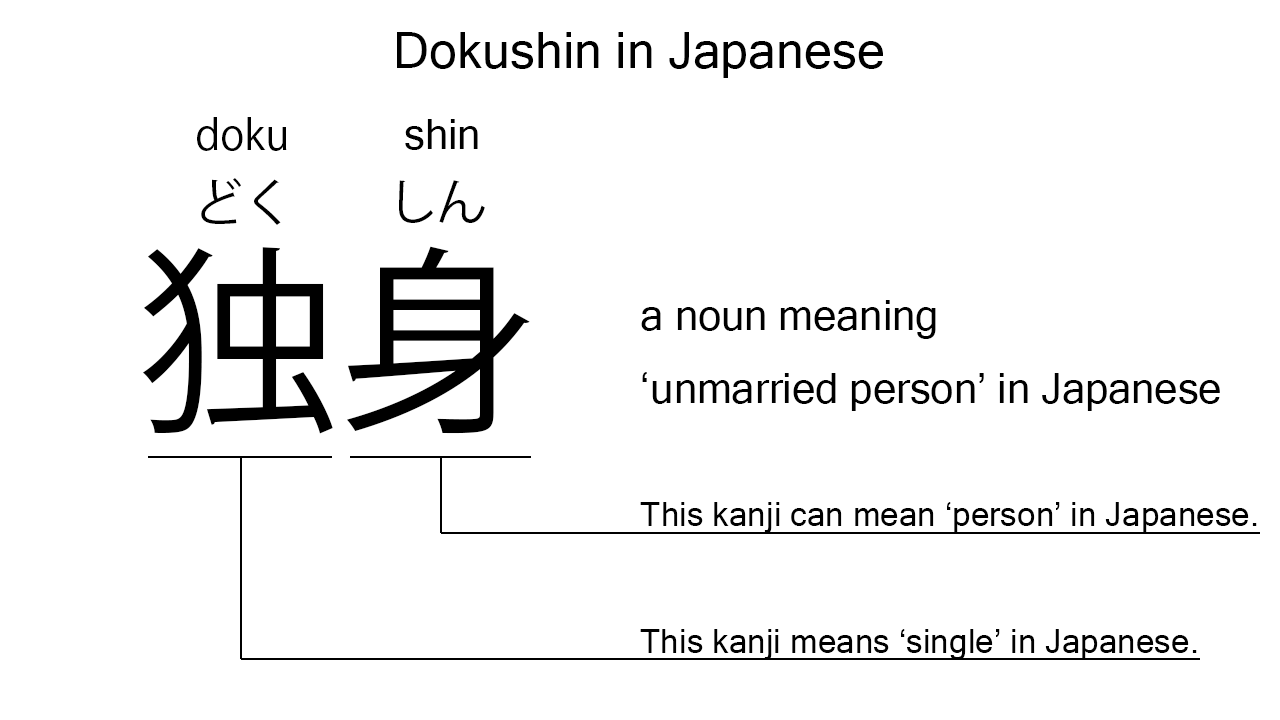What does “dokushin” mean in Japanese?
Native speakers say “dokushin” often to mean ‘unmarried person’ in Japanese. Perhaps, some Japanese learners know this word as it is sometimes used in Japanese movies, novels, manga, anime, and the like. In this blog post, however, I will explain this word in detail based on its kanji expression. And also, I will explain how to use it through example sentences. My explanations would help Japanese learners understand “dokushin” more clearly. Then, let’s get started!
Contents
Definition and meanings of “dokushin”
Let me start with the definition and meanings of “dokushin”.
- dokushin – 独身 (どくしん) : a noun meaning ‘unmarried person’ or ‘state of being unmarried’ in Japanese. This can also work as plural. Learn more about Japanese plural.
Japanese native speakers use this noun to refer to a person who has not married yet or the state of being unmarried.
The definition and meanings are not that difficult, I think. To understand this noun more clearly, however, let me explain its kanji characters in detail, one by one.
Dokushin in kanji
The kanji expression of “dokushin” consists of the following two kanji characters:
- 独 : a kanji character used to mean ‘single’, ‘alone’, or such in Japanese.
- 身 : a kanji character used to mean ‘body’, ‘person’, ‘life’, or such in Japanese.
These two kanji characters tell us that the formed noun literally means a ‘single person’ in Japanese. This literal interpretation is very close to the actual meanings.

When we meet new kanji expressions, we should check their kanji characters in detail to understand their meanings clearly and deeply. In many cases, kanji characters tell us a lot about the meanings of the expressions they form. Actually, here, we could get the better understanding of “dokushin” through the detailed kanji check above.
So far, I’ve explained the definition and meanings of “dokushin” together with its kanji characters. Then, let me explain how to use it through the example sentences below.
Example #1: how to use “dokushin”
boku wa dokushin desu – 僕は独身です (ぼくはどくしんです)
I’m single.
Below are the new words used in the example sentence.
- boku – 僕 (ぼく) : a pronoun meaning ‘I’ in Japanese. This is used mainly by boys and young males.
- wa – は : a binding particle working as a case marker or topic marker. In the example, this works after “boku” to make the subject in the sentence.
- desu – です : an auxiliary verb used after a noun or adjective to make it polite. Probably, this is well known as a part of Japanese desu form. In the example, this is used after “dokushin” to make it sound polite.
This is a typical usage of “dokushin”. In this example, it has been translated into English as ‘single’. In Japanese, however, it just refers to the state of being unmarried. It does not have any nuance of ‘not being in a romantic relationship with anyone’. It’s worth knowing, I think.
Example #2: another usage of “dokushin”
dokushin no kazu ga fue te iru – 独身の数が増えている (どくしんのかずがふえている)
The number of unmarried people is increasing.
Below are the new words used in the example sentence.
- no – の : a case particle joining two nouns or noun equivalent words. Normally, the first one can work as a modifier to describe the second. In the example, this works to join “dokushin” and “kazu”. The formed phrase literally means ‘the number of unmarried people’ in Japanese.
- kazu – 数 (かず) : a noun meaning ‘number’ in Japanese. This can also work as plural.
- ga – が : a case particle used to make the subject word or the object word in a sentence. In the example, this is used after “dokushin no kazu” to make the subject in the sentence.
- fue – 増え (ふえ) : one conjugation of the verb, “fueru”, which means ‘to increase’ in Japanese. In the example, it has been conjugated for the better connection with its following word.
- te – て : a conjunctive particle used after a verb, adjective, or auxiliary verb to make its te form. In the example, this is used after “fue” to make its te form, “fue te”. Verbs need to be changed to their te forms to be connected with “iru”.
- iru – いる : an auxiliary verb used to express the continuity of the action described by its preceding verb. In the example, this is used after “fue te” to express the continuity of its action.
This is another typical usage of “dokushin”. In this example, it works as a part of the noun phrase, “dokushin no kazu”, which means ‘the number of unmarried people’ in Japanese. When we want to mean ‘unmarried people’ in Japanese, this noun is a good option.
Summary
In this blog post, I’ve explained the definition and meanings of “dokushin” in detail based on its kanji expression. And also, I’ve explained how to use it through the example sentences. Let me summarize them as follows.
- dokushin – 独身 (どくしん) : a noun meaning ‘unmarried person’ or ‘state of being unmarried’ in Japanese. This can also work as plural. Japanese native speakers use this noun to refer to a person who has not married yet or the state of being unmarried. It is also worth mentioning here that this noun does not have any nuance of ‘not being in a romantic relationship with anyone’.
Hope my explanations are understandable and helpful for Japanese learners.